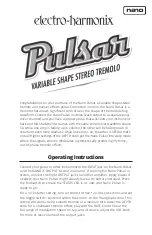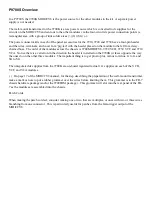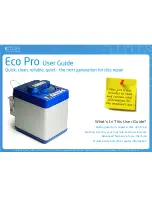OPERATION AND MAINTENANCE
5-7
Wheel Bearing Maintenance
Wheel bearing maintenance should be performed at the
beginning of every season of use. Check the wheel
bearings periodically for excessive end play. If needed,
adjust or replace them using the following procedure:
1.
Place the frame on blocks or stands sufficient to lift
the tire clear of the ground.
2.
Remove the tire.
3.
Remove the hub cap, cotter pin, slotted nut and
washer.
4.
Remove the hub. Clean and inspect the bearings and
hub cavity. Replace any worn or defective parts.
5.
Repack the bearings using a high-quality wheel
bearing grease.
6.
Slide the seal onto the spindle. Do not install the seal
into the hub.
7.
Slide the inner bearing cone and hub onto the
spindle.
8.
Install the outer bearing cone, washer and slotted
nut.
9.
Torque spindle nut to 50 ft. lbs. Rotate hub both
directions a minimum of one quarter turn to set
bearings. Back off spindle nut until loose and torque
to 27 ft. lbs. If necessary, back off spindle nut until the
nut slot is lined up with the cotter pin hole. Do not
back off more than one flat of nut. Install new cotter
pin. Bend cotter pin to secure spindle nut.
10. Install a new hub cap. Coat inside of cap with grease.
NOTE
The seals should point away from the hub to keep
contaminants out and allow grease to pass.
11. Position seal over seal bore. Rotate seal in an inward
motion to ensure sealing surfaces are facing away
from the hub. Install seal flush with seal bore casting
surface.
12. When greasing hubs, fill hub until grease is purged
from seal.
Hydraulic Maintenance
1.
Check the tractor hydraulic fluid level per tractor
owner's manual and after any leakage. Check fluid
level with the cylinders in the retracted position.
2.
If a cylinder or valve leaks, disassemble the parts to
determine the cause of the leak. Any time a cylinder
is opened up, or whenever any seal replacement is
necessary, it is advisable to clean all parts and
replace all seals. Seal kits are available from your
Landoll dealer.
3.
Check all hydraulic hoses weekly. Look for binding or
cracking. Replace all worn or defective parts
immediately.
IMPORTANT
Lower the unit to the ground, and relieve hydraulic
pressure before attempting to service any hydraulic
component.
4.
Transport locks are provided to hold the implement in
a raised position. Do not attempt to perform any
service work under the implement without first
installing the transport locks. Before servicing any
hydraulic component, lower the implement to the
ground and relieve all system pressure. If a hydraulic
component is disconnected, repaired, or replaced, it
will be necessary to purge the system of air before
operation.
See “Hydraulic Lift System” on
on how to purge the hydraulic systems.
Transport
1.
Check and follow all federal, state, and local
requirements before transporting the 6510.
2.
The 6510 should be transported only by tractor
required for field operation. The implement weight
should not exceed more than 1.5 times the tractor
weight. Maximum transport speed for the 6510 is 20
mph for the implement.
CAUTION
3.
When towing equipment in combination, the
maximum equipment ground speed shall be limited
to the lowest specified ground speed of any of the
towed implements.
4.
Maximum transport speed shall be the lesser of
travel speed specified in the operator's manual,
speed identification symbol, information sign of
towed equipment, or limit of road conditions.
Excessive speed may result in loss of control of
the tractor and implement, reduced braking
ability, or failure of the implement tire or
structure. Do not exceed the implement
maximum specified ground speed regardless of
the capability of the maximum tractor speed.
Summary of Contents for ICON 6510
Page 2: ......
Page 8: ......
Page 38: ...3 30 F 753 0914 Edition ILLUSTRATED PARTS LIST Table provided for general use NOTES ...
Page 42: ...4 4 F 753 0914 Edition STANDARD SPECIFICATIONS Table provided for general use NOTES ...
Page 60: ...7 4 F 753 0914 Edition NUMERICAL INDEX Table provided for general use NOTES ...
Page 61: ......


















